

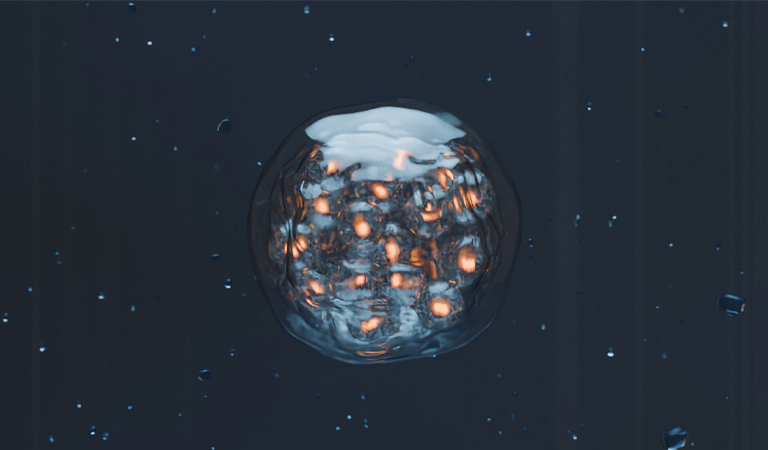
The room is quiet. A soft hum from the advanced incubators fills the air a reminder that life is delicate, yet full of potential. Before you lies a single petri dish: your embryo, the result of careful creation in ICSI. It is fragile, invisible to the naked eye, but in your hands, it carries the promise of a future.
Under the gentle guidance of Dr. Mayleen, you prepare to nurture this life in the Incusphere, a next-generation incubator designed to replicate the first critical days of growth. Every adjustment you make temperature, humidity, nutrient flow, oxygen balance carries meaning. Every moment of observation, every careful calibration, is an act of care. Here, life begins its first journey under your watchful eyes.
“Go ahead,” said Dr. Mayleen softly, standing beside you.
“Bring them to a place where they can begin their journey.”
Your hands trembled just slightly as you lifted the petri dish. It was light—almost weightless—but the meaning it carried was immeasurable.
You stepped toward a sleek, transparent device called the Incusphere—a next-generation incubator designed to replicate the human womb during the embryo’s first five days.
The touchscreen flickered on. One by one, you adjusted the temperature, humidity, oxygen levels, nutrient flow, and micropressure. The system blinked red until each condition was just right.
“Remember,” said Dr. Mayleen,
“it’s not only about the science. It’s about care. This will be their first home.”.”
Once all indicators turned green, you gently opened a small hatch at the top. Slowly, you placed the petri dish inside.
The lid sealed automatically. A warm light glowed from within. Day one had begun.
Day 1
The zygote began to divide—into two cells, then four, then more. You watched through the monitor. No sounds, just silent multiplication. Life unfolding, quietly.
Days 2–3
The embryo became a morula—a cluster of tightly packed cells, forming like a snowflake under a microscope. The system reported strong, healthy division.
Each morning, you returned to check. You placed your hand on the glass, spoke gently, sometimes read a story. Other times, you just sat in silence.
Days 4–5
The morula evolved into a blastocyst, a more advanced structure. The outer layer—trophoblast—would one day form the placenta. The inner cell mass would become the baby.
Dr. Mayleen approached with a tablet. “They’re ready,” she said with a soft smile.
“It’s time to bring them closer to your heartbeat.”
This room felt different—quieter, warmer, like a secret chamber. In the center stood ARTWOMB, an artificial uterus engineered to simulate post-implantation development.
You watched as the embryologist carefully lifted the blastocyst from the incubator. With precision, they guided it into a soft channel connected to ARTWOMB.
“This process is called embryo transfer,” said Dr. Mayleen.
“No blood. No pain. Just love, moving from one place to another.”
As the blastocyst floated gently inside the clear fluid of ARTWOMB, the surrounding monitors lit up—adjusting temperature, supplying nutrients, and initiating a simulated pulse to welcome the new life.
You were asked to place your hand against the surface of ARTWOMB. Sensors read your emotional resonance and converted it into micro-sound waves transmitted inside.
“From today forward,” whispered Mayleen,
“you are not just an observer. You are their first home.”
After the incubation period, your embryo is transferred to the ARTWOMB and carefully moved from HOPE Labs to this nurturing environment called Beyond Residence. It’s more than a residence—it’s the beginning of a future life shared together.
During these six days, the experience was more than observation it was emotional stewardship. You could examine your embryo in full 3D, zooming in to see cells divide, clusters form into a morula, and finally the blastocyst emerge with its inner cell mass and trophoblast layers. Vital statistics accompanied each observation cell health, division rate, and genetic stability providing insight into the subtle rhythm of growth. The Incusphere required ongoing calibration, from turning dials for temperature to balancing pH and nutrient supply, ensuring that every factor was just right. Interactive elements, like placing your hand on the incubator glass, allowed you to contribute emotional input that subtly influenced the embryo’s environment.
For co-op players, a Live Chat feature enabled sharing discoveries, coordinating daily tasks, and celebrating each milestone together. A digital Embryo Log recorded progress, mistakes, and triumphs, while a Photo Log preserved the moments of quiet growth, letting you capture the embryo’s evolving form each day. “Ask the Doctor” tutorials offered visual guidance at any point, making sure no detail was overlooked.
Each in-game day flowed as a careful balance of attention and action. Random events, like minor contamination or unexpected electrical fluctuations, could disrupt the embryo’s environment. Quick reactions were necessary, requiring mini-games or timed sequences to stabilize the conditions. Neglect or repeated mistakes allowing parameters to remain critical too long or mishandling the embryo risked developmental arrest, forcing a restart of the incubation period. The climax came on Day Six: the embryo transfer. Players guided the blastocyst through a precision mini-game into ARTWOMB, avoiding obstacles and carefully aligning the embryo with the entry port. Success meant the embryo settled safely into its nurturing environment, ready for continued growth. Failure meant repeating critical steps, reinforcing the fragility of early life and the importance of care, focus, and collaboration.
As the embryo gently settled into ARTWOMB, a soft glow illuminated the chamber. Watching it now, you felt the quiet satisfaction of responsibility honored and the subtle anticipation of what was to come. The six days of vigilance, careful adjustments, and patient observation had concluded, but the journey was far from over. The embryo, once confined to the incubator, now rested in a carefully prepared home where it could continue to thrive. This marked the transition from your role as caretaker within the lab to guardian of a life beginning its first chapter beyond HOPE Laboratory, ready for the next stage in Segment 6: Trimester 1.
A small yet vital vessel, the Petri Dish is where your embryo first begins its journey. After fertilization, the embryo is carefully placed in this transparent dish, allowing it to be observed and prepared for incubation. It serves as the embryo’s first temporary home before entering the controlled environment of the Incusphere—a delicate starting point for the miracle of life.

The Incusphere is an advanced incubation device designed to replicate the conditions of a natural womb during the embryo’s earliest development. With precise control over temperature, air pressure, humidity, and nutrients, it provides a safe and stable environment for the embryo during the critical five-day incubation period. It is the first cradle of life—where technology and care come together to protect what matters most.
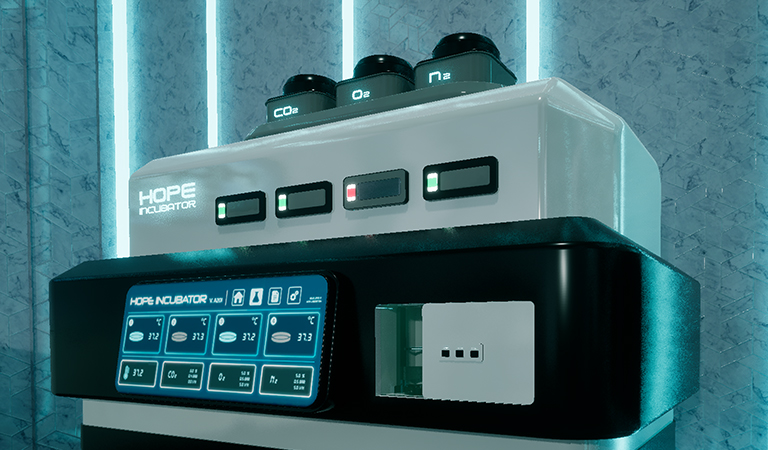
You are not just a witness—you are a guardian. During the five-day incubation period, you are entrusted with maintaining the perfect environment for your growing embryo. Inside the Incusphere, you must carefully monitor and adjust air pressure and temperature to ensure optimal conditions. Your attention, precision, and care are essential in protecting this delicate beginning of life.
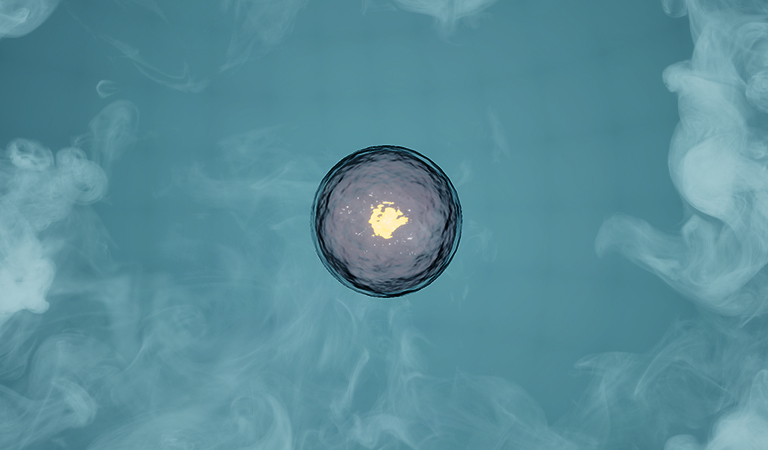
ARTWOMB is a highly advanced artificial womb designed to support the continued growth and development of your embryo after incubation. Mimicking the natural environment of a human uterus, it provides optimal warmth, nutrients, and gentle rhythmic pulses—creating a safe and loving space where life can flourish. It is not just a device; it is the first true home for your Little Us.
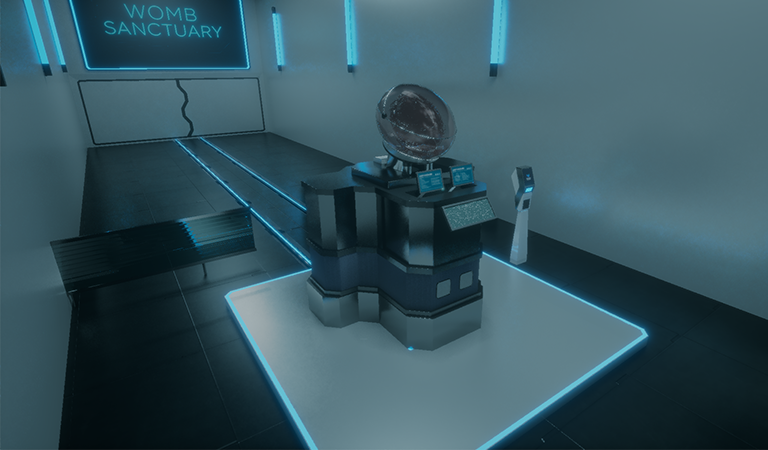
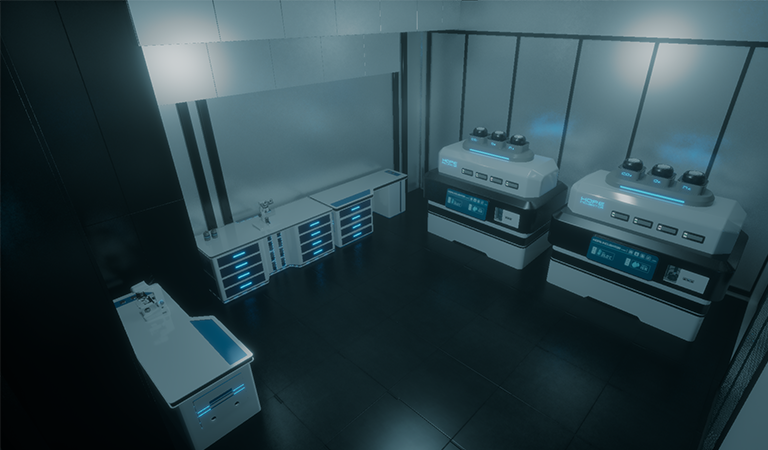
A sterile, softly lit chamber where science and hope intertwine. The Incubation Room is where your embryo begins its earliest development—gently nurtured for five critical days inside a high-tech incubator. Here, every element—temperature, oxygen, light, and silence—is precisely calibrated to protect and support the miracle of life at its most fragile stage.
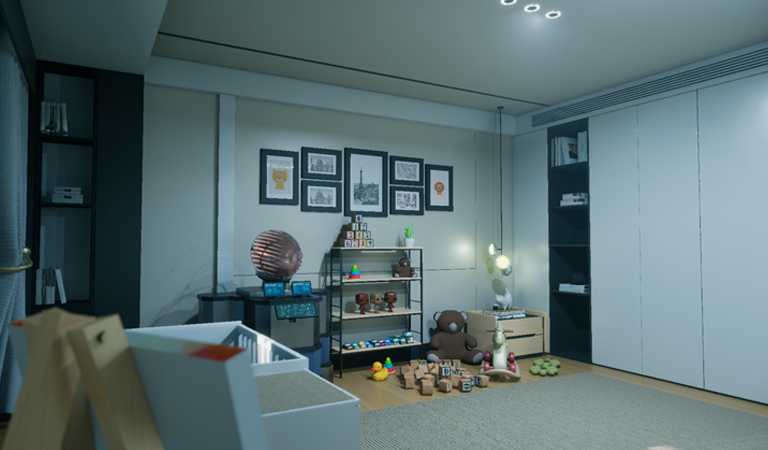
A serene and thoughtfully designed living settlement, Beyond Residence offers the perfect balance of comfort, care, and connection. Here, you are given a private home—a peaceful space where your Little Us will continue to grow. After the incubation period, your embryo is transferred to the ARTWOMB and carefully moved from HOPE Labs to this nurturing environment. It’s more than a residence—it’s the beginning of a future life shared together.


Gantha Studio is the development studio behind the simulation game Little Us.
© 2024 Created by GANTHA STUDIO
Gantha Studio is the development studio behind the simulation game Little Us.
© 2024 – Gantha Studio